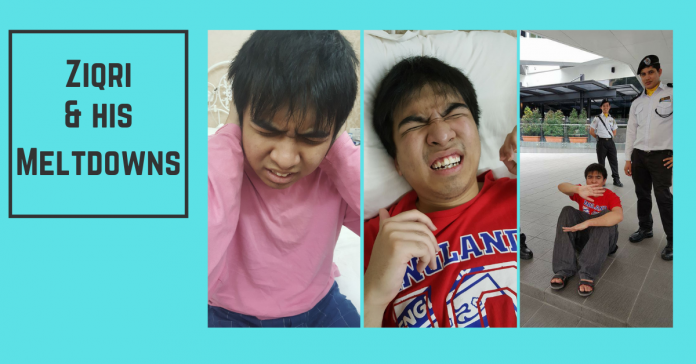
Disbelief, fear, anger, worry, heartbroken, regrets – some of the emotions parents of autistic children feel when their child is first diagnosed. And if you have another child, or two, who is also diagnosed to be on the Autism Spectrum (ASD), then you can add doubly-angry, self-pity, even suicidal to those emotions you felt when your older child was first diagnosed.
Many parents of autism kids have the same worry across the board. Whether they are wealthy or struggling to make ends meet – almost all of them fear for the future for their kids. This is because you may have all the money in the world to engage caregivers for their children, or they may have other awesome offsprings who readily take over the role of parents to their ASD siblings, but the future for these kids is as uncertain as Autism itself.
“You are lucky, you know, at least your sons can walk, talk and do other daily activities. Not like those unfortunate kids who cannot do anything for themselves and just lie flat on their backs,” said a relative many years ago in trying to comfort me when my second son Aidel was also diagnosed to be on the spectrum after brother Ziqri was diagnosed much earlier.
Yes, we are blessed, Ziqri is a joy most times, while Aidel, who has Aspergers but is totally high functioning, is an intelligent and talented child. But they do things differently, they thrive in their own unique way, in their own speed and timeframe. To get them to conform is most times an exercise in futility.

The thing is, Autism is unexpected. You may not know you have it, but wonder why you are different than everyone else. And for some of these kids, they are unable to tell you why they have that loud noise in their head, why there is so much light flickering in certain part of their brain, even though it is quiet and dark outside. I have been told that that is what children with overload sensory moments go through. And that is the time when the child goes through meltdowns, rolling on the floor, get irritated with what they are wearing, shouting at the top of their voice – with onlookers looking perplexed and at you with that bad parenting accusation in their expressions.
Please Understand My Child
If the onlookers look closely, they can see the plea in the parent’s eyes. Please understand my child. I have tried my best. You have only seen this side of him in the last five minutes, we live with it 24/7, 364 days in a year x 40 years, and more.

Apart from all that, there is also something called stimming which refers to self-stimulating behaviours, usually involving repetitive movements or sounds. And while everybody stims in some way, it’s not always clear to others.
Stimming however, is part of the diagnostic criteria for autism. That’s not because stimming is always related to autism, but it’s because stimming in people with autism can get out of control and cause problems. Stimming isn’t necessarily a bad thing that needs to be stifled. But it should be addressed when it’s disruptive to others and interferes with quality of life.
It goes without saying then that most parents with typically-developing children experience stress, but for those raising children with autism, everyday life often brings Stress with a capital S. Apart from everything else, we need to keep our child from running away, manage meltdowns, go back and forth with teachers about special education needs, avoid sights or sounds that overload his senses, and drive to therapists or doctors. And that’s just what Monday looks like. They do all this while sleep-deprived. Many children with autism simply don’t sleep well, so neither do mom and dad.
Sadly, those stresses don’t necessarily end on a child’s 18th or 21st birthday. Ask me. I can’t say the stress is any less now than it was when Ziqri was five years old. That was two decades ago. Ziqri is turning 25, does not go to work, and lives at home. Of course the trauma of his infamous arrest almost three years ago still lives on. And after that incident, he regressed, something a number of autism young adults go through sometimes.
Many parents, so focused on their children’s needs, don’t stop to think about their own health. The struggle is real, so is their well-being. If parents of typically-developing children have to be strong to weather the challenges faced in today’s world, parents of autism children need to be like Superheroes – flitting from one endless challenge to another. This roller-coaster ride for autism parents will continue until they leave this world. Stories of aged single parents looking after their 50 year-old autistic sons or daughters are real issues, so parents have to take care of themselves while they are young.
Common Worry Denominator
All in all, parents of autistic children have one common worry denominator: The future of their children. For them, the future starts now. They can’t afford to plan far ahead, they just have to do what’s best now. And hope. And pray. And tell the world to be kind to their offsprings when they are no longer around.

The support system for autism parents – family, relatives, friends is so important. Sometimes it’s to share their problems, other times is just a get-together for a brief respite. In an article in The Guardian, there is a list of suggestions on how to walk the talk with an autism parent friend. So if you know someone who has a child with autism, here are 10 ways you can help:
1. Encourage your friend to seek out whatever support is on offer from social and educational services. When parents and services work together in a mutually respectful way, everyone is a winner.
2. Support your friend to advocate for her child. Medical professionals and school staff often focus on what the child can’t do. As a mother, I need to feel positive about my children and want those involved in their care to see their strengths as well as challenges. Having a friend who knows my child come along to a difficult meeting to support me is invaluable.
3. Much advice can be gleaned from local parents’ groups, and it is a great comfort for a parent to meet others in the same boat. But if your friend is feeling overwhelmed entering the world of special needs, she may need you to accompany her to initial meetings.
4. Strangers’ curiosity is often unwelcome. An inquisitive stare or an ill-judged remark can be the last straw. Having you by her side to fend off unwanted interest, or offer calm explanations will make all the difference.
5. Broken sleep is often a huge issue for children with autism. Their parents’ physical, mental and emotional health can suffer from many sleepless nights. If you know her child well enough, offer to stay in the house occasionally and be the one to get up instead.
6. Occasional respite care can be a godsend, allowing your friend time to invest in her marriage, spend time with her other children or just recharge her batteries. But the thought of allowing strangers to care for her child may fill her with guilt. She may need you to help explore what local services can offer in the way of respite care.
7. As the child grows older, their differences may become more apparent. Behaviours such as rocking, flapping hands or bouncing (often called stimming) may mark them out. Because it draws attention to their child, some parents find stimming acutely embarrassing and try to stop it. But stimming isn’t just some annoying habit; it often gives a good indication of how a person with autism is feeling. It can show their distress or their joy, it can be a comfort or distract them from something intolerable.
8. Family functions, such as parties and long, celebratory meals, can be tricky with an autistic child. Be on hand to help out. Pack a goody bag filled with distractions. This does not need to be expensive; spinners, balloons and stretchy toys can be great diversions. A preprepared goody bag can be the difference between your friend being able to stay at the celebration or having to leave early with a distressed child.
9. A mother of an autistic child may say that she can’t come for an evening out, as it is simply too difficult for her to leave home. Keep asking, keep reminding her that she is a valued friend, and that her company is very much wanted.
10. I firmly believe that dealing with today’s problems is quite enough. Discourage your friend from trying to plan too far ahead. Energy spent worrying about the future will drain her energy for today. Our young people with autism can surprise us, developing in ways that seemed impossible when they were children. Calm parents, love and unconditional acceptance are vital ingredients for ensuring happy adult autists.
Another useful resource is this.
In Part 2 of this article, we will hear from other autism parents here on what they go through from the time their child was first diagnosed with autism, through his growing years, and their expectations for their future. In Part 3, we will read about an amazing mum who became one at the tender age of 15 only to find out her son is autistic. If that’s not all, she went through a divorce, a major accident that left her in a coma, underwent dire straits financially, to be rewarded with a brilliant son. More amazing and heart-wrenching stories you will read here. Watch this space. – New Malaysia Herald
About the author: Hasnah Abdul Rahman is the editor-in-chief of the New Malaysia Herald while being an activist for autism. She has worked for various media organisations as reporter and editor and specialises in strategic communications. She is also a foodpreneur in her spare time and gives traditional cuisine that 5-star edge from her home kitchen.
Datin Hasnah is the co-founder and CEO of New Malaysia Herald based in Kuala Lumpur, Malaysia.
With an extensive background in mass communication and journalism, she works on building up New Malaysia Herald and it’s partner sites. A tireless and passionate evangalist, she champions autism studies and support groups.
Datin Hasnah is also the Editor in Chief of New Malaysia Herald.


Facebook Comments